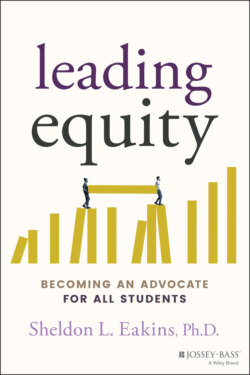Читать книгу Leading Equity - Sheldon L. Eakins - Страница 7
Preface
ОглавлениеAnd what did you do?
—Anonymous
I have spent a lot of time thinking about what it means to be an advocate. It is a concept that I find intriguing as many of us have different thoughts regarding what it means. An advocate recognizes that we do not live in a just society. Advocates are not satisfied with the status quo and are willing to speak up on behalf of others. I know it sounds good on paper, and I do not say this to you as if I have always been on my game when it comes to doing advocacy work in education. I've made mistakes; I've missed opportunities; I'm not flawless in my approach because many situations I have faced have caught me off guard and have left me without the words or mental preparation to respond. I believe we are all on a journey in which there is no end or final arrival.
This book will help guide you in your daily approaches to becoming a better advocate in education. For more than a decade, I've interacted with many educators who have asked questions about what language they can use to address their concerns. See, for some of us, doing this work may mean that we might have to place our professional relationships at risk. It might even cause us to jeopardize our jobs and positions in our school's community. I get it; it's not always fun to tell peers that what they said or did negatively impacts a particular group of people.
We live in a world where being nice is often the preferred approach to communication. Unfortunately, racism, discrimination, and bigotry exist. My thoughts are, Should we be so concerned about being nice and about other people's feelings when they didn't consider a nice approach to us or others when they said what they said? For example, in some areas of the United States such as the Midwest and the South, being nice is a cultural standard. Calling someone out goes against the unwritten protocols in communication, but being nice doesn't always equate to change. Compromising our beliefs regarding what is right and what is wrong does not equate to change. However, I hear you, and I want to help. My goal is to provide multiple ways for you to interact with others to teach you strategies to address injustices tactfully. Some of us are bolder than others and have more experience dealing with implicit and explicit instances that negatively impact our schools. Some of us are brand new to the concept of equity and want to learn how we can develop our advocacy skills. Finally, some of us are in leadership positions and have a more significant impact on leading change. However, creating staff buy-in is a challenge. No matter where you are in your journey toward equity, I'm here to increase your knowledge and confidence in this work. However, before we get started, let's talk about the word ally.
A common question that I get involves some form of “Sheldon, I want to do better. I want to help others and be an ally. I want to be a voice and support my peers, colleagues, students, and parents. Nonetheless, situations occur, and I don't necessarily know the terminology. What should I say?” I like to give educators the tools and resources necessary to ensure equity at their school. I try to give the language they need and provide them with examples of situations by saying, “This is what I said. This is what I would say in these types of situations,” to help folks out. As I started thinking about many of my experiences as an educator and as an individual doing this work, I started thinking about that word, ally.
